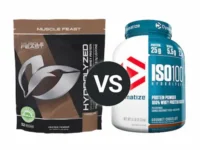Knowledge BaseYou're Questions Answered
BACK
Can creatine and whey protein be taken at the same time?
Yes, creatine and whey protein can be taken at the same time. In fact, combining these supplements can offer synergistic benefits for muscle growth, recovery, and exercise performance. Here's how taking creatine and whey protein together can help you achieve your fitness goals.
Benefits of Taking Creatine and Whey Protein Together
- Enhanced Muscle Growth and Strength: Whey protein provides essential amino acids that support muscle protein synthesis, while creatine improves strength and power output. Together, they can promote greater gains in muscle size and strength1.
- Improved Exercise Performance: Creatine increases the availability of ATP (adenosine triphosphate), a quick energy source for high-intensity activities. When combined with whey protein's muscle-repairing amino acids, this can lead to better performance in strength training and endurance exercises2.
- Faster Recovery: Both creatine and whey protein can reduce muscle damage and inflammation, aiding in quicker recovery between workouts. This allows for more frequent and intense training sessions3.
Timing and Dosage Guidelines
- Creatine Dosage: A typical dosage is 3-5 grams per day, taken pre- or post-workout. Some athletes prefer a loading phase of 15-20 grams per day for the first 5-7 days to saturate muscle creatine stores, followed by a maintenance dose of 3-5 grams per day4.
- Whey Protein Dosage: A standard serving size is around 20-30 grams of protein, typically taken post-workout to support muscle recovery and growth. Adjust the dosage based on your protein needs and dietary goals5.
- Combining Both: Creatine and whey protein can be mixed into a single shake or smoothie and taken post-workout for optimal recovery. They can also be consumed separately based on personal preference.
Taking creatine and whey protein at the same time is safe and can offer complementary benefits for muscle growth, strength, and recovery. Be sure to follow the recommended dosages and integrate them into a balanced diet and exercise program for the best results.
Was this answer helpful? Let us know!
Like
References:
- Kreider, R. B., Kalman, D. S., Antonio, J., Ziegenfuss, T. N., Wildman, R., Collins, R., ... & Lopez, H. L. (2017). International Society of Sports Nutrition position stand: safety and efficacy of creatine supplementation in exercise, sport, and medicine. Journal of the International Society of Sports Nutrition, 14(1), 18.
- Rawson, E. S., & Venezia, A. C. (2011). Use of creatine in the elderly and evidence for effects on cognitive function in young and old. Aging Health, 7(3), 435-442.
- Cooper, R., Naclerio, F., Allgrove, J., & Jimenez, A. (2012). Creatine supplementation with specific view to exercise/sports performance: an update. Journal of the International Society of Sports Nutrition, 9(1), 33.
- Persky, A. M., & Brazeau, G. A. (2001). Clinical pharmacology of the dietary supplement creatine monohydrate. Pharmacological Reviews, 53(2), 161-176.
- Phillips, S. M. (2014). A brief review of higher dietary protein diets in weight loss: a focus on athletes. Sports Medicine, 44(S1), S149-S153.
Add to this Answer
Related Questions
Related Reviews

Disclosure
Your Answer
Do you have a suggestion to improve the answer? Please detail your suggestions and provide any references to information that may support your answer if available.
The content on this site has not been written, reviewed or endorsed by a medical professional. We assume no liability for the misuse of supplements and recommend you review the label of any product, as well as consulting with your health care professional.
We are a participant in the Amazon Services LLC Associates Program, an affiliate advertising program designed to provide a means for us to earn fees by linking to Amazon.com and affiliated sites.
We are a participant in the Amazon Services LLC Associates Program, an affiliate advertising program designed to provide a means for us to earn fees by linking to Amazon.com and affiliated sites.
© 2026 ProteinPowder.com



